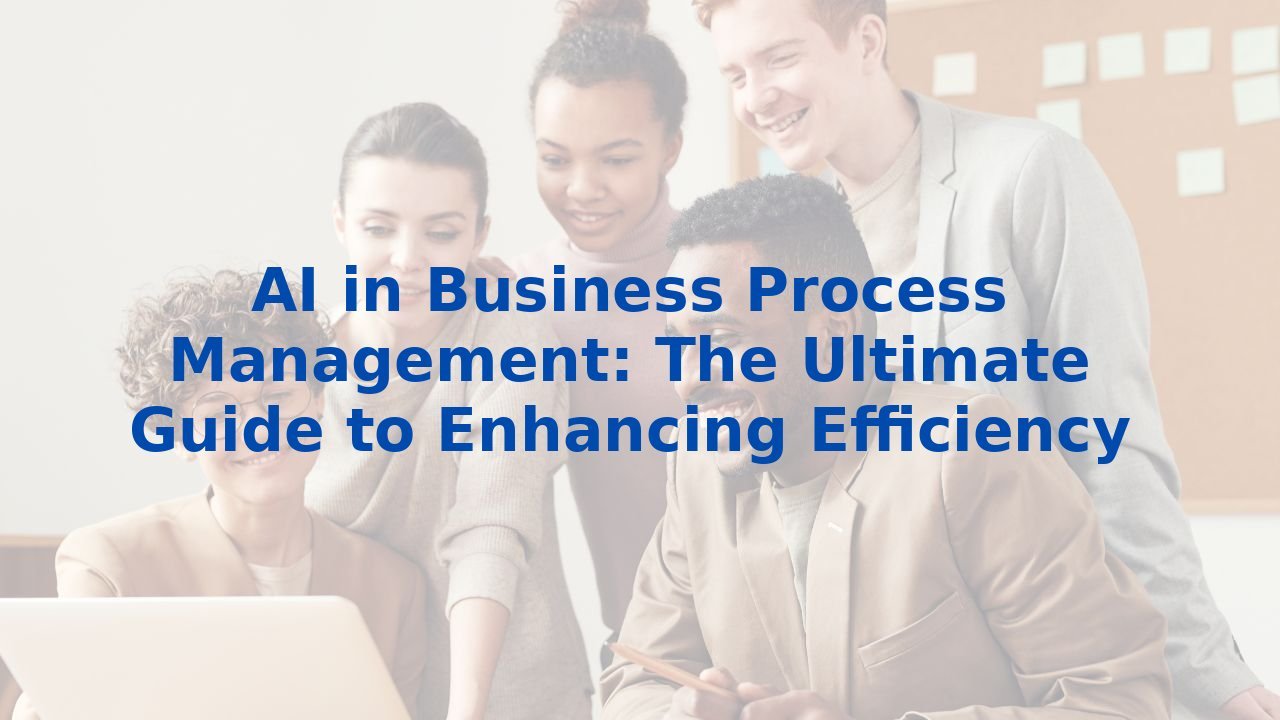AI in Business Process Management: The Ultimate Guide to Enhancing Efficiency
AI in Business Process Management: The Ultimate Guide to Enhancing Efficiency
As the complexities of modern business operations grow, organizations are searching for effective strategies to optimize their processes. Enter the transformative power of Artificial Intelligence (AI), a game-changer that can reshape how businesses operate. By enhancing core business processes, AI offers a pathway to improved efficiency, productivity, and decision-making. This guide delves into various business processes and highlights how AI can take them to the next level.
1. Process Discovery and Mapping
Understanding and optimizing workflows is a cornerstone of Business Process Management (BPM). Traditionally reliant on manual data analysis, process discovery is where AI shines the brightest. With its advanced data analysis and pattern recognition capabilities, AI-driven process mining tools can uncover hidden inefficiencies and visualize the workflows at play.
Imagine having an eagle-eyed assistant that tirelessly analyzes your processes and highlights areas for improvement. That’s what AI brings to the table—actionable insights that foster a more efficient organization.
2. Process Automation
The most visible impact of AI on BPM is the automation of mundane, repetitive tasks. By employing tools that incorporate Robotic Process Automation (RPA), businesses can significantly cut down on manual labor. Think about data entry, document processing, and even customer queries—tasks that usually consume hours can be streamlined with ease.
Freeing human employees to focus on strategic activities isn't just a luxury; it's a necessity in today’s fast-paced business environment.
3. Decision-Making and Predictive Analytics
AI is not just reactive; it’s proactive. By revealing trends, predicting outcomes, and identifying root causes, AI enhances decision-making capabilities within organizations. Its capability to analyze vast data sets swiftly offers insights that would otherwise remain elusive. For example, AI can identify which customers are poised to generate more revenue or even flag potential bottlenecks in processes, allowing teams to act before issues escalate.
In a world awash with data, AI acts as your guide, directing you toward informed choices and strategic advancements.
4. Customer Service and Sales Enhancement
The landscape of customer service and sales is undergoing a dramatic transformation thanks to AI technologies. AI-powered chatbots diligently handle basic inquiries, enabling human agents to tackle more complex issues. On the sales front, AI analyzes customer data to recommend the most effective sales channels, suggest upsell opportunities, and prioritize leads, ensuring a consistent approach to customer engagement.
Imagine every customer interaction being tailored and efficient, leading to enhanced satisfaction and loyalty.
5. Product Development and Content Generation
AI's influence extends to product development and content generation, offering innovative solutions that save time and resources. Generative design software leverages AI to explore countless designs, ensuring the best options are brought to the forefront. Simultaneously, AI-driven content generation tools produce engaging articles, product descriptions, and marketing copy quickly and efficiently.
The Benefits of AI for Improving Efficiency
Integrating AI into business processes yields numerous advantages:
- Improved Efficiency: Automating tasks and swiftly analyzing data leads to higher productivity.
- Enhanced Decision-Making: AI provides data-backed insights that refine your strategic direction.
- Reduced Errors: Automation minimizes human error, fostering greater accuracy across the board.
- Proactive Problem-Solving: AI can identify issues in real-time, allowing for immediate resolutions.
The Importance of Training Employees for AI
While AI is undoubtedly a powerful ally, its efficacy is only fully realized through proper employee training. Here’s why investing in training is crucial:
- Understanding AI Capabilities: Employees must grasp what AI can do to leverage its potential effectively.
- Operational Efficiency: Trained staff can employ AI tools efficiently, ensuring the maximum benefits from automation.
- Adaptability: As AI evolves, ongoing training enables employees to adapt seamlessly to new technologies.
- Strategic Alignment: Skilled workers can align AI capabilities with organizational goals, meaning improvements are in line with the bigger picture.
Conclusion
The integration of AI into business processes is not merely a trend; it’s a fundamental shift that redefines operational excellence. By enhancing process discovery, automation, decision-making, and customer service, AI significantly elevates efficiency and productivity. However, to unlock the full potential of AI, organizations must prioritize employee training and foster a culture of learning. In a highly competitive landscape, embracing AI and equipping employees for its implementation will be key to achieving sustained success.



